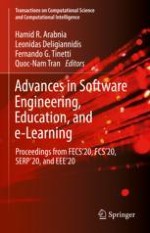2021 | OriginalPaper | Chapter
Benchmarking the Software Engineering Undergraduate Program Curriculum at Jordan University of Science and Technology with the IEEE Software Engineering Body of Knowledge (SWE Knowledge Areas #6–10)
Author : Moh’d A. Radaideh
Published in: Advances in Software Engineering, Education, and e-Learning
Publisher: Springer International Publishing
Activate our intelligent search to find suitable subject content or patents.
Select sections of text to find matching patents with Artificial Intelligence. powered by
Select sections of text to find additional relevant content using AI-assisted search. powered by
